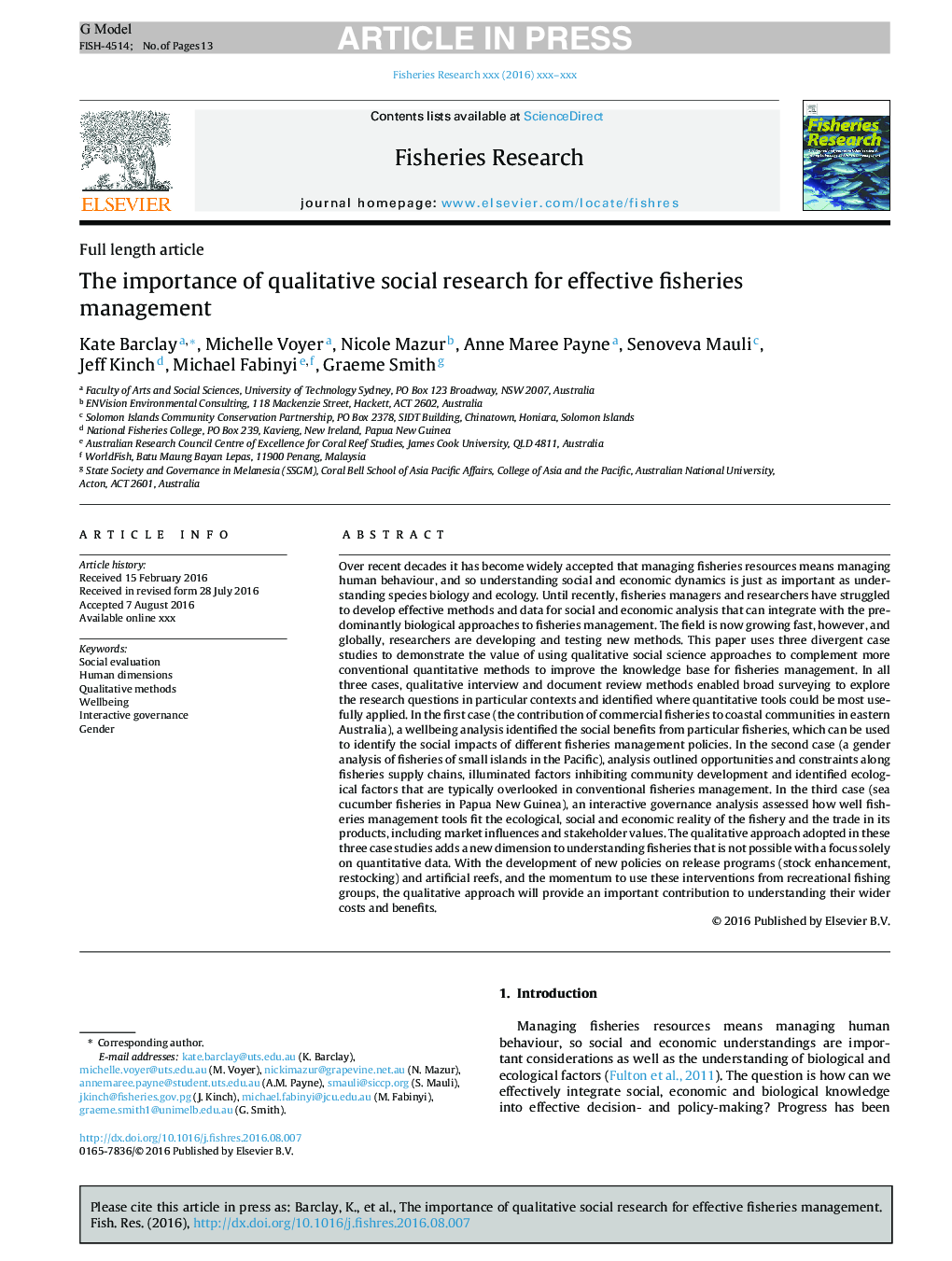| کد مقاله | کد نشریه | سال انتشار | مقاله انگلیسی | نسخه تمام متن |
|---|---|---|---|---|
| 5765563 | 1413078 | 2017 | 13 صفحه PDF | دانلود رایگان |
عنوان انگلیسی مقاله ISI
The importance of qualitative social research for effective fisheries management
ترجمه فارسی عنوان
اهمیت تحقیقات اجتماعی کیفی برای مدیریت ماهیانه موثر
دانلود مقاله + سفارش ترجمه
دانلود مقاله ISI انگلیسی
رایگان برای ایرانیان
کلمات کلیدی
ارزیابی اجتماعی، ابعاد انسانی، روش های کیفی، تندرستی، حکومت تعاملی، جنسیت،
ترجمه چکیده
در دهه های اخیر، به طور گسترده ای پذیرفته شده است که مدیریت منابع شیلات به معنای مدیریت رفتار انسان است و بنابراین شناخت دینامیک اجتماعی و اقتصادی به اندازه شناخت زیست شناسی گونه ها و محیط زیست بسیار مهم است. تا همین اواخر، مدیران و محققان ماهیگیری تلاش کرده اند تا روش های و داده های موثر برای تجزیه و تحلیل اجتماعی و اقتصادی را که می توانند با رویکرد غالب بیولوژیکی به مدیریت ماهیگیری ادغام شوند، توسعه داده اند. در حال حاضر این میدان در حال افزایش است، با این حال، و در سطح جهانی، محققان در حال توسعه و آزمایش روش های جدید هستند. این مقاله با استفاده از سه مطالعه موردی متفاوت برای نشان دادن ارزش استفاده از رویکردهای روش های کیفی کیفی برای تکمیل روش های کمی معمول تر برای بهبود پایگاه دانش برای مدیریت ماهیگیری استفاده می کند. در هر سه مورد، مصاحبه کیفی و روش بررسی سند، بررسی های گسترده ای را برای بررسی سؤالات تحقیق در زمینه های خاص انجام دادند و مشخص کردند که آیا ابزار کمی می تواند بیشتر مورد استفاده قرار گیرد. در مورد اول (سهم شیلات تجاری در جوامع ساحلی در شرق استرالیا)، تجزیه و تحلیل خوبی از مزایای اجتماعی شیلات خاصی است که می تواند برای شناسایی تاثیرات اجتماعی سیاست های مختلف مدیریت ماهیانه استفاده شود. در مورد دوم (تجزیه و تحلیل جنسیتی از ماهیگیری جزایر کوچک در اقیانوس آرام)، تجزیه و تحلیل فرصت ها و محدودیت های زنجیره تامین زنجیره ای، عوامل برجسته ای را که مانع توسعۀ جامعه می شوند، شناسایی کرده و عوامل محیطی را که معمولا در مدیریت زراعی متعارف نادیده گرفته می شود، مشخص می کند. در مورد سوم (ماهیگیری خبیث دریا در پاپوآ گینه نو) یک تحلیل حکومتی تعاملی ارزیابی می دهد که چطور ابزارهای مدیریت ماهیانه متناسب با وضعیت زیست محیطی، اجتماعی و اقتصادی ماهیگیری و تجارت محصولات خود، از جمله تاثیرات بازار و ارزش سهامداران است. رویکرد کیفی که در این سه مورد مورد استفاده قرار گرفت، ابعاد جدیدی را برای درک شیلات فراهم می کند که تنها با توجه به داده های کمی امکان پذیر نیست. با توسعه سیاست های جدید در مورد برنامه های آزاد (افزایش سهام، بازسازی) و صخره های مصنوعی و حرکت به استفاده از این مداخلات از گروه های ماهیگیری تفریحی، رویکرد کیفی نقش مهمی در فهم هزینه ها و مزایای وسیع آنها خواهد داشت.
موضوعات مرتبط
علوم زیستی و بیوفناوری
علوم کشاورزی و بیولوژیک
علوم آبزیان
چکیده انگلیسی
Over recent decades it has become widely accepted that managing fisheries resources means managing human behaviour, and so understanding social and economic dynamics is just as important as understanding species biology and ecology. Until recently, fisheries managers and researchers have struggled to develop effective methods and data for social and economic analysis that can integrate with the predominantly biological approaches to fisheries management. The field is now growing fast, however, and globally, researchers are developing and testing new methods. This paper uses three divergent case studies to demonstrate the value of using qualitative social science approaches to complement more conventional quantitative methods to improve the knowledge base for fisheries management. In all three cases, qualitative interview and document review methods enabled broad surveying to explore the research questions in particular contexts and identified where quantitative tools could be most usefully applied. In the first case (the contribution of commercial fisheries to coastal communities in eastern Australia), a wellbeing analysis identified the social benefits from particular fisheries, which can be used to identify the social impacts of different fisheries management policies. In the second case (a gender analysis of fisheries of small islands in the Pacific), analysis outlined opportunities and constraints along fisheries supply chains, illuminated factors inhibiting community development and identified ecological factors that are typically overlooked in conventional fisheries management. In the third case (sea cucumber fisheries in Papua New Guinea), an interactive governance analysis assessed how well fisheries management tools fit the ecological, social and economic reality of the fishery and the trade in its products, including market influences and stakeholder values. The qualitative approach adopted in these three case studies adds a new dimension to understanding fisheries that is not possible with a focus solely on quantitative data. With the development of new policies on release programs (stock enhancement, restocking) and artificial reefs, and the momentum to use these interventions from recreational fishing groups, the qualitative approach will provide an important contribution to understanding their wider costs and benefits.
ناشر
Database: Elsevier - ScienceDirect (ساینس دایرکت)
Journal: Fisheries Research - Volume 186, Part 2, February 2017, Pages 426-438
Journal: Fisheries Research - Volume 186, Part 2, February 2017, Pages 426-438
نویسندگان
Kate Barclay, Michelle Voyer, Nicole Mazur, Anne Maree Payne, Senoveva Mauli, Jeff Kinch, Michael Fabinyi, Graeme Smith,
